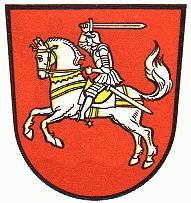Süderdithmarschen: Difference between revisions
Knorrepoes (talk | contribs) (Created page with '{|width="100%" style="color:black; background-color:#ffffcc;" |width="15%"|50 px|left |width="70%" align="center" |'''Heraldry of the World<br/>Civic heraldr…') |
Knorrepoes (talk | contribs) m (Text replacement - "↵↵'''" to "'''") Tags: Mobile edit Mobile web edit |
||
| (34 intermediate revisions by the same user not shown) | |||
| Line 1: | Line 1: | ||
'''SÜDERDITHMARSCHEN (MED)''' | |||
State : [[Schleswig-Holstein]]<br/> | |||
Incorporated into : 1970 [[Dithmarschen]] | |||
[[File:suderdit.kreis.jpg|center|alt=Wappen von {{PAGENAME}}/Arms (crest) of {{PAGENAME}}]] | |||
{| class="wikitable" | |||
|+Official blazon | |||
|- | |||
|'''German''' | |||
| blazon wanted | |||
|- | |||
|'''English''' | |||
| blazon wanted | |||
|} | |||
===Origin/meaning=== | |||
The arms were granted in 1963. | The arms were granted in 1963. | ||
Dithmarschen was a free republic from the 13th until the 16<sup>th</sup> century. After the conquest in 1559 by Adolf of Gottorf, Duke of Holstein, his brother Johann of Haldersleben and his nephew King Fredrich II of Denmark, Dithmarschen was split in Norder- and Süderdithmarschen. Both new territories had until 1867 rather much political freedom. | |||
The oldest seals of Dithmarschen showed the St. Mary and St. Oswald, the two patron saints of the republic. The seal of Dithmarschen on the Act of Capitulation in 1559 shows the St. Mary as Mother Dolorosa, probably indicating the loss of freedom. After the capitulation no single seal has been used for Dithmarschen. Norderdithmarschen used in the late 16<sup>th</sup> century a seal with the St. Mary in a cross with solar rays. | |||
The knight in the present arm appears rapidly after 1559 in the arms of the Dukes of Holstein for the new territory. It was not popular in Dithmarschen, as it showed a knight of Holstein. However, in the 18<sup>th</sup> century the governors of both Dithmarschens started to use the knight as a symbol. Finally in the 19<sup>th</sup> century it was adapted as the symbol of Dithmarschen by the population. Both the counties started to use the knight in their seals in the 1930s. | |||
{{de}} | |||
{{media}} | |||
[[Literature]] : Stadler, K. : Deutsche Wappen - Bundesrepublik Deutschland. Angelsachsen Verlag, 1964-1971, 8 volumes; Reissmann, M. : Die Wappen der Kreise, Ämter, Städte und Gemeinden in Schleswig-Holstein. Landesarchiv Schleswig-Holstein, Husum, 1997. | [[Civic Heraldry Literature - Germany|'''Literature''']]: Stadler, K. : Deutsche Wappen - Bundesrepublik Deutschland. Angelsachsen Verlag, 1964-1971, 8 volumes; Reissmann, M. : Die Wappen der Kreise, Ämter, Städte und Gemeinden in Schleswig-Holstein. Landesarchiv Schleswig-Holstein, Husum, 1997. | ||
[[Category:Kreiswappen]] | [[Category:Kreiswappen]] | ||
[[Category:Schleswig-Holstein]] | [[Category:Schleswig-Holstein]] | ||
[[Category: | [[Category:Süderdithmarschen]] | ||
[[Category:Granted 1963]] | [[Category:Granted 1963]] | ||
Latest revision as of 14:56, 7 January 2024
SÜDERDITHMARSCHEN (MED)
State : Schleswig-Holstein
Incorporated into : 1970 Dithmarschen
| German | blazon wanted |
| English | blazon wanted |
Origin/meaning
The arms were granted in 1963.
Dithmarschen was a free republic from the 13th until the 16th century. After the conquest in 1559 by Adolf of Gottorf, Duke of Holstein, his brother Johann of Haldersleben and his nephew King Fredrich II of Denmark, Dithmarschen was split in Norder- and Süderdithmarschen. Both new territories had until 1867 rather much political freedom.
The oldest seals of Dithmarschen showed the St. Mary and St. Oswald, the two patron saints of the republic. The seal of Dithmarschen on the Act of Capitulation in 1559 shows the St. Mary as Mother Dolorosa, probably indicating the loss of freedom. After the capitulation no single seal has been used for Dithmarschen. Norderdithmarschen used in the late 16th century a seal with the St. Mary in a cross with solar rays.
The knight in the present arm appears rapidly after 1559 in the arms of the Dukes of Holstein for the new territory. It was not popular in Dithmarschen, as it showed a knight of Holstein. However, in the 18th century the governors of both Dithmarschens started to use the knight as a symbol. Finally in the 19th century it was adapted as the symbol of Dithmarschen by the population. Both the counties started to use the knight in their seals in the 1930s.
This page is part of the German heraldry portal |
Heraldry of the World |
|
German heraldry:
|
Selected collector's items from Germany:
|
Contact and Support
Partners:
Your logo here ?
Contact us
© since 1995, Heraldry of the World, Ralf Hartemink 
Index of the site
Literature: Stadler, K. : Deutsche Wappen - Bundesrepublik Deutschland. Angelsachsen Verlag, 1964-1971, 8 volumes; Reissmann, M. : Die Wappen der Kreise, Ämter, Städte und Gemeinden in Schleswig-Holstein. Landesarchiv Schleswig-Holstein, Husum, 1997.












